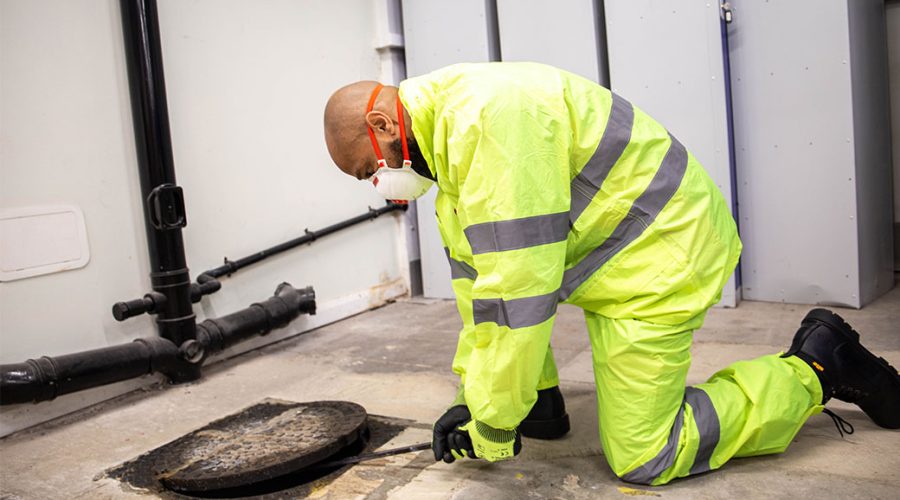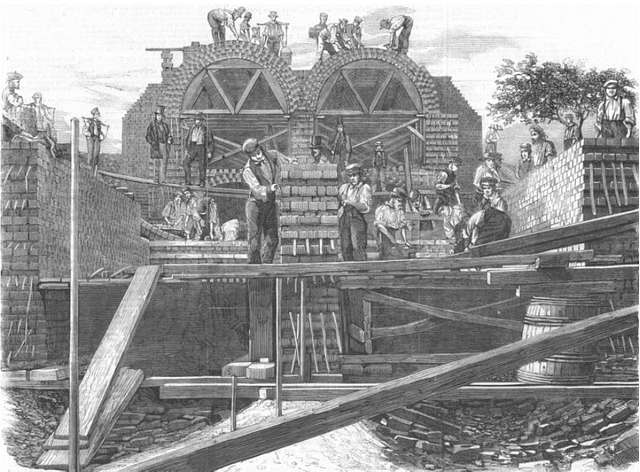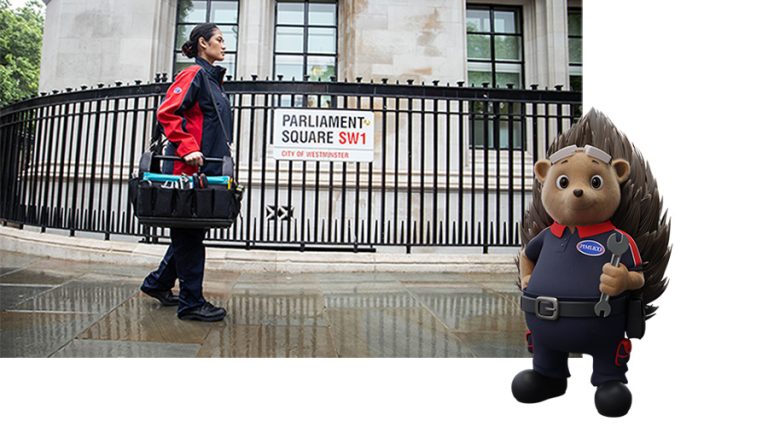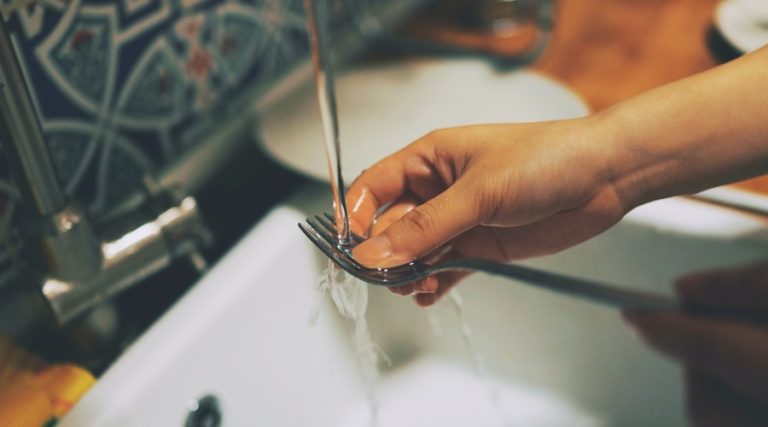The definitive guide to drainage services

Maintaining a healthy drainage system is more than just a matter of convenience; it’s a cornerstone of a well-functioning home or business. In this guide, we’ll explore not only the significance of regular drain maintenance, but also provide insights into recognising early signs of drainage issues and the potential hazards of overlooking them.
The importance of drain maintenance
Your drains quietly play a crucial role in the overall functionality of your property. Beyond facilitating the flow of wastewater, they contribute to a sanitary and safe environment. Proactively preventing blockages avoids issues like slow drainage and water damage, preserving structural integrity. Regular maintenance extends the plumbing system’s lifespan, contributes to environmental responsibility by preventing pollution, and ensures regulatory compliance. A well-maintained drainage system enhances property appeal and value, making it integral to comprehensive property management.
Signs of a drainage problem
Recognising the early signs of drainage problems can be a game-changer. From subtle changes in water flow to strange sounds emanating from your pipes, we’ll guide you through the indicators that something might be amiss below the surface. Early identification can save you from more extensive and costly issues later.
Dangers of ignoring drainage issues
Ignoring drainage issues is akin to turning a blind eye to a ticking time bomb. Beyond the inconvenience of slow drains, there are genuine dangers associated with neglecting drainage problems. From structural damage to health hazards, we’ll outline the potential risks of overlooking these crucial components of your property.
Common drainage problems
Understanding the landscape of common drainage problems is essential for effective maintenance. Let’s explore prevalent issues in detail and offer comprehensive solutions.
- Blocked drains
Blocked drains are an all-too-common woe that can disrupt the smooth functioning of your daily life. For effective DIY drain maintenance, use a mixture of vinegar and baking soda, or a plunger, to clear minor blockages. Remove debris regularly and avoid pouring grease down drains. However, if issues persist, such as recurrent blockages or slow drainage, it’s time to call in professionals. Additionally, if you notice water damage, foul odours, or gurgling sounds, these could indicate more serious problems requiring professional assessment and intervention. A proactive approach can save you from the frustration of sudden blockages.
- Drain leaks
Leaking drains are not only an inconvenience but can lead to extensive water damage and mould growth. Detect drain leaks by checking for water stains, mould, or unpleasant odours. Repair small leaks with waterproof tape or epoxy, and tighten loose fittings. For larger or persistent leaks, seek professional help. Addressing leaks promptly prevents structural damage and mould growth. If you notice sagging ceilings or an unexplained increase in water bills, it’s crucial to consult professionals for a thorough inspection and repair. Identifying and resolving leaks promptly can safeguard your property from long-term damage.
- Slow-draining sinks and showers
Irritation with slow-draining sinks and showers is a common household complaint. To address slow-draining sinks and showers, start with DIY solutions like using a plunger or a drain snake to remove hair and debris. Pouring a mixture of baking soda and vinegar can also help break down clogs. However, if these methods don’t resolve the issue, it may indicate more complex problems like pipe misalignment or tree root intrusion. In such cases, it’s advisable to consult professionals for a thorough inspection and efficient repair to prevent further damage. Understanding the reasons allows for targeted solutions, ensuring your daily routines remain hassle-free.
- Foul odours from drains
Unpleasant odours emanating from drains are not only a nuisance, but can be indicative of more profound issues. Combat foul odours from drains with DIY solutions like pouring a mixture of baking soda and vinegar or using a bacterial drain cleaner. Regularly flush drains with hot water to prevent build-up. However, persistent odours may indicate a more severe issue, such as a blocked vent or sewer line problems. In such cases, professional inspection is recommended to identify and address the root cause efficiently, ensuring a fresh and odour-free drainage system. A fresh-smelling home is a healthy home.
DIY drain solutions
- Simple drain cleaning methods
Regular cleaning is crucial for preventing blockages. Follow these practical tips for DIY drain maintenance:
- Use a mixture of baking soda and vinegar to break down grease and debris.
- Invest in a drain snake for removing hair and other material from pipes.
- Flush drains with hot water regularly to prevent build-up.
- Preventing drain clogs
Take proactive measures to avoid drain clogs with these homeowner-friendly tips:
- Install drain guards to catch debris before it enters the pipes.
- Avoid pouring grease or oil down the drain.
- Regularly flush drains with boiling water to prevent grease build-up.
- When to call a professional plumber?
While DIY methods are effective, there are times when professional help is necessary. Recognise signs of serious drainage issues:
- Persistent, foul odours from drains may indicate a more significant problem.
- Slow drainage in multiple fixtures could signal a larger blockage.
- Unexplained increases in water bills might point to hidden leaks.
If you detect a potential drain issue which needs a professional hand, then get in touch with your local plumber.
When DIY solutions fall short, or when you simply prefer the assurance of professional expertise, Pimlico is here to help. In this section, we’ll showcase the breadth of our professional drainage services, the experience of our certified plumbers, and the convenience of our 24/7 emergency services.
Comprehensive range of drainage services
Our drainage services extend beyond simple blockage removal. From routine maintenance to advanced solutions like drain lining, we cover the entire spectrum of drainage needs. Explore the details on our dedicated Drainage Services page, to understand the full extent of how we can cater to your unique requirements.
Experienced and certified plumbers
Our team comprises seasoned and certified plumbers, each bringing a wealth of experience and professionalism to every job. Get acquainted with the history of Pimlico and our services on our About Us page. Knowing the expertise of those handling your drainage issues will give you the confidence you need, knowing your property is in safe hands.
24/7 Emergency drain services
Drainage problems are not bound by the clock. That’s why we offer 24/7 emergency drain services. Timely intervention can mean the difference between minor inconveniences and major property damage. Discover the peace of mind that comes with knowing you can rely on us at any hour with our emergency drain services.
Importance of regular drain maintenance
Prevention is the cornerstone of a well-maintained drainage system. In this section, we’ll delve deeper into the benefits of regular drain cleaning, how it can save you from costly repairs, and its role in maintaining a healthy and odour-free environment.
- Benefits of regular drain cleaning
Regular drain cleaning is not just about preventing blockages; it brings a multitude of benefits. Beyond ensuring clear pipes, regular cleaning improves plumbing efficiency, contributes to a healthier living or working space, and prevents foul odours. Discover how this simple routine can enhance the overall well-being of your property. - Preventing costly repairs
Proactive maintenance is not just about convenience; it’s a strategic approach to cost management. By investing in regular maintenance, you not only prevent costly plumbing repairs but also make a long-term investment in the overall health of your property. This proactive approach not only saves you money but also ensures the smooth functioning of your plumbing system, providing peace of mind for the future. - Keeping your drains healthy and odour-free
Simple practices, such as regularly flushing drains with hot water, using a mixture of baking soda and vinegar, and installing drain guards, can go a long way in preventing unpleasant odours. A fresh-smelling home is not only inviting but also indicative of a hygienic living space. Discover how these easy maintenance tips can elevate the overall ambiance of your home in our comprehensive guide.
Tips for healthy drains
Maintaining healthy drains is an ongoing effort that requires a combination of good habits and occasional professional intervention. In this section, we’ll provide detailed tips that you can incorporate into your routine to prevent issues and ensure optimal drain performance.
Avoid pouring grease and oil down drains
Grease and oil are notorious for causing drain clogs. Instead, let them cool and solidify, then dispose of them in the bin. Use a strainer to catch food particles, and regularly clean it. For existing clogs, try using a mixture of baking soda and vinegar or a plunger. In severe cases, professional assistance may be necessary. Consistent adherence to proper disposal practices minimises the risk of clogs, ensuring a smooth and efficient drainage system. Small adjustments in your kitchen habits can go a long way in preserving the health of your drains.
Use a drain catcher
Using a drain catcher is a proactive and beneficial measure for maintaining healthy drains. This simple device acts as a barrier, preventing hair, debris, and other potential clog-causing materials from entering your pipes. By effectively capturing these elements before they can accumulate, a drain catcher not only helps prevent blockages but also promotes smooth water flow, reducing the risk of plumbing issues. Incorporating a drain catcher into your regular maintenance routine is a cost-effective and practical way to ensure the long-term health of your drainage system, saving you both time and money on potential repairs.
Regularly flush drains with hot water
Flushing drains with hot water is a beneficial practice for maintaining healthy plumbing. This simple yet effective technique helps dissolve and wash away accumulated grease, soap scum, and other residues that can lead to blockages and unpleasant odours. The hot water not only clears any immediate build-up, but also promotes the overall cleanliness and efficiency of your drainage system. By making regular hot water flushing a part of your maintenance routine, you contribute to the prevention of clogs, ensuring that your drains remain free-flowing and your plumbing stays in optimal condition. This proactive approach is a cost-efficient way to enhance the longevity and functionality of your home’s drainage infrastructure.
Get professional drain cleaning every 6-12 months
Scheduling professional drain cleaning every 6-12 months is a highly beneficial practice for ensuring the longevity and efficiency of your plumbing system. Professional services employ specialised equipment and techniques to thoroughly remove accumulated debris, sediment, and potential blockages from your pipes. This proactive measure not only prevents clogs but also addresses issues at their early stages, reducing the risk of more severe plumbing problems down the line. Regular professional drain cleaning promotes optimal water flow, helps maintain a hygienic environment, and can ultimately save you from the inconvenience and expense of unexpected plumbing emergencies. By incorporating this routine into your annual home maintenance schedule, you invest in the continued well-being of your plumbing infrastructure.
Responsibility for drain health
1.1 Indoor drains
Indoor drains typically include those found in kitchens, bathrooms, and laundry rooms. Responsibilities for keeping indoor drains healthy may vary depending on the specific location within the property. Here are some key points:
Homeowner responsibilities:
- Regularly clear debris screens in sink and shower drains.
- Avoid disposing of grease, large food particles, and non-flushable items down toilets.
- Use drain-friendly cleaning products to prevent clogs.
Landlord/tenant responsibilities:
- Clarify responsibilities in the lease agreement regarding drain maintenance.
- Promptly report and address any issues to the property manager.
1.2 Outdoor drains
Outdoor drains, including those in the garden or driveway, play a crucial role in preventing flooding and water damage. Responsibilities for outdoor drains typically fall on the property owner:
Regular maintenance:
- Clear leaves, debris, and other obstructions from outdoor drains.
- Inspect and clean gutters to prevent debris build-up.
Professional inspections:
- Schedule regular inspections by drainage professionals to identify potential issues.
General guidance and solutions
2.1 Before contacting an expert
Before reaching out to a drainage service expert, homeowners can take certain steps to troubleshoot common drainage problems:
DIY solutions:
- Locate step-by-step instructions for simple DIY solutions, such as using a plunger for minor clogs.
- Share safe and eco-friendly methods for cleaning drains, such as using baking soda and vinegar.
Identifying issues:
- You can learn to identify the source of drainage problems, whether it’s a clog, tree roots, or a damaged pipe.
- Use a checklist for common signs of drainage issues, like slow drains or unpleasant odours.
2.2 Covered by home insurance?
Explore the coverage aspects of home insurance related to drainage issues:
Homeowners insurance:
- Coverage: Typically, homeowners insurance covers sudden and accidental damage, including certain types of water damage. However, it may not cover damage resulting from lack of maintenance or gradual deterioration.
- Relevance to drainage: If a sudden event, such as a burst pipe, leads to water damage, homeowners’ insurance may provide coverage. However, issues related to poor drainage maintenance might not be covered.
Flood insurance:
- Coverage: Flood insurance is a separate policy that covers damage caused by flooding, including overflow of rivers, heavy rain, or storm surges within London. It is often required in designated flood zones.
- Relevance to drainage: If poor drainage leads to flooding inside the home, homeowners may need flood insurance to cover the resulting damage.
Sewer backup coverage:
- Coverage: Some homeowners policies offer optional sewer backup coverage, which can help cover damage caused by sewer or drain backups.
- Relevance to drainage: If a drain backup leads to damage within the home, this coverage may help with repair costs.
Water backup coverage:
- Coverage: Like sewer backup coverage, water backup coverage can help cover damage caused by water backing up through sewers or drains.
- Relevance to drainage: This coverage may be relevant if drainage issues result in water backup and damage to the property.
It’s important for homeowners to carefully review their insurance policies, understand the coverage limits and exclusions, and consider additional coverage options based on their specific needs and their location within London. Moreover, consulting with an insurance professional can provide personalised advice based on individual circumstances.
2.3 Preventive measures:
Preventing sudden damage:
Regular maintenance, such as cleaning gutters, clearing debris from outdoor drains, and inspecting the plumbing system, can prevent sudden and unexpected damage to the property. Insurance policies often cover sudden and accidental damage, so by minimising the risk of such events through maintenance, homeowners may reduce the likelihood of needing to make a claim.
Avoiding gradual deterioration:
Insurance policies may exclude coverage for damage resulting from gradual deterioration or lack of maintenance. By consistently maintaining drainage systems, homeowners can avoid issues that might be deemed as neglect and, therefore, not covered by insurance. Inspecting and addressing small problems promptly can prevent them from turning into larger, more costly issues that may not be covered.
Meeting policy requirements:
Some insurance policies have specific requirements for maintenance and care of the property. Failure to meet these requirements could result in coverage limitations or exclusions. Regular maintenance, documented through records or receipts, can demonstrate to insurance providers that the homeowner has taken steps to fulfil policy obligations.
Qualifying for discounts:
Some insurance providers offer discounts for homeowners who implement certain safety and maintenance measures. This may include installing sump pumps, maintaining clear drainage paths, or upgrading plumbing systems. By taking advantage of these discounts, homeowners not only reduce their insurance premiums but also demonstrate a commitment to proactive property management.
Mitigating secondary damage:
Timely maintenance can help prevent secondary damage, such as mould growth, that may occur because of water intrusion. Insurance policies often cover the cost of repairing direct damage, but addressing secondary damage may also be important for a comprehensive claim.
Maintaining property value:
Regular maintenance contributes to preserving the overall value of the property. Insurance coverage is often based on the property’s value, and a well-maintained home is more likely to be eligible for higher coverage limits.
It’s essential for homeowners to keep detailed records of their maintenance activities, including receipts, inspection reports, and any communication with professionals hired for maintenance tasks. In the event of a claim, these records can serve as evidence of proactive measures taken to care for the property, potentially facilitating smoother claims processing and demonstrating compliance with insurance policy terms.
Drainage services FAQs
Even with a comprehensive guide, questions may arise. In this section, we address common questions about drainage services, providing clarity and additional insights into the intricacies of maintaining a healthy drainage system.
- Why do drains get clogged, and how can I prevent it?
Drains can get clogged due to the accumulation of hair, soap scum, grease, and debris. To prevent clogs, use drain catchers, flush drains with hot water regularly, and avoid disposing of grease down the drain. - What are the signs that indicate I may need professional drainage services?
Signs include slow drainage in multiple fixtures, gurgling sounds, foul odours, and recurring clogs. If you experience any of these issues, it’s advisable to seek professional drainage services. - How often should I schedule routine maintenance for my drainage system?
Regular maintenance is recommended every 6-12 months. This includes tasks such as professional drain cleaning, flushing drains with hot water, and using preventive measures like drain catchers. - What causes foul odours from drains, and how can I address them?
Foul odours may result from organic matter build-up or blocked vents. Regular hot water flushing, using enzymatic cleaners, and ensuring proper ventilation can help address and prevent unpleasant odours. - Can I perform DIY drain repairs, or should I always hire a professional plumber?
Minor issues like simple clogs can often be addressed with DIY methods, such as using a plunger or a drain snake. However, for complex problems or persistent issues, it’s advisable to consult a professional plumber to avoid exacerbating the problem. - Are chemical drain cleaners safe to use?
Chemical drain cleaners can be effective, but they may damage pipes over time. It’s recommended to use them sparingly and consider alternative methods like enzymatic cleaners for regular maintenance. - How can I tell if my drains are blocked or if there’s a more significant plumbing issue?
Persistent slow drainage, unusual sounds, and foul odours can indicate a blocked drain. If these issues persist after DIY attempts, it’s best to consult a professional plumber to assess for more significant plumbing problems. - What should I do if I have a sudden drain emergency?
In a drain emergency, turn off the water supply if possible and avoid using plumbing fixtures. Contact a professional plumber immediately to assess and address the issue promptly. - Can tree roots cause drainage problems?
Yes, tree roots can infiltrate pipes, causing blockages and damage. If you suspect tree root issues, consult a professional plumber to assess and address the root intrusion. - Is preventive drain maintenance necessary if I haven’t experienced any issues?
Yes, preventive drain maintenance is essential to catch potential issues early and avoid costly repairs. Regular maintenance, including flushing drains with hot water and using drain catchers, contributes to the overall health of your plumbing system.
Armed with knowledge about drainage maintenance and the services offered by Pimlico, it’s time to act!
Ready to take the next step in ensuring the health of your drains? We invite you to contact Pimlico for a free drainage consultation or quote. Visit our contact page, to initiate the conversation. We’re ready to assist you in maintaining a healthy and happy drainage system.







